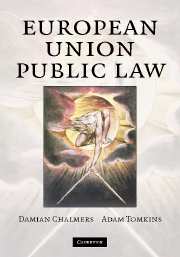Book contents
- Frontmatter
- Map of the European Union
- Preface
- Contents
- Abbreviations
- Acknowledgments
- Table of Cases
- Table of Treaties, Instruments and Legislation
- Table of Equivalents
- Electronic Working Paper Series
- PART I Constitutional and Institutional Law
- PART II Administrative law
- 8 Accountability in the European union
- 9 The enforcement of European law
- 10 Judicial review: the legal accountability of the Community institutions
- Index
- References
8 - Accountability in the European union
Published online by Cambridge University Press: 05 June 2012
- Frontmatter
- Map of the European Union
- Preface
- Contents
- Abbreviations
- Acknowledgments
- Table of Cases
- Table of Treaties, Instruments and Legislation
- Table of Equivalents
- Electronic Working Paper Series
- PART I Constitutional and Institutional Law
- PART II Administrative law
- 8 Accountability in the European union
- 9 The enforcement of European law
- 10 Judicial review: the legal accountability of the Community institutions
- Index
- References
Summary
Introduction
The first part of this book (chapters 1–7) explored what might be termed the constitutional fundamentals of the European legal order. The principal focus was on the powers enjoyed by the institutions and bodies of the European Union. Constitutions, however, perform two main tasks, of which setting out public authorities' powers is but one. The other, equally important, task is to set out the ways in which the exercise of public power may be held to constitutional account. It is with this aspect of the constitutional function that the following three chapters are concerned. First, in this chapter, we explore something of the various ‘political’ mechanisms that exist in the European Union to secure accountability. In chapters 9 and 10 we turn to what might be termed ‘legal accountability’, as we consider in detail the ways in which the courts may enforce the rule of European law, first, against and within Member States and, secondly, against the institutions of the EU.
This chapter commences with a brief explanation of what is, and what is not, meant by the term ‘accountability’. The various contributions to the search for accountability that have been made by the European Parliament are then outlined. In the third section of the chapter we examine the importance of notions of transparency to accountability within the EU. As we shall see, without transparency there can be little accountability and it is in this context, perhaps, that the EU has progressed furthest.
- Type
- Chapter
- Information
- European Union Public LawText and Materials, pp. 311 - 347Publisher: Cambridge University PressPrint publication year: 2007
References
- 1
- Cited by



